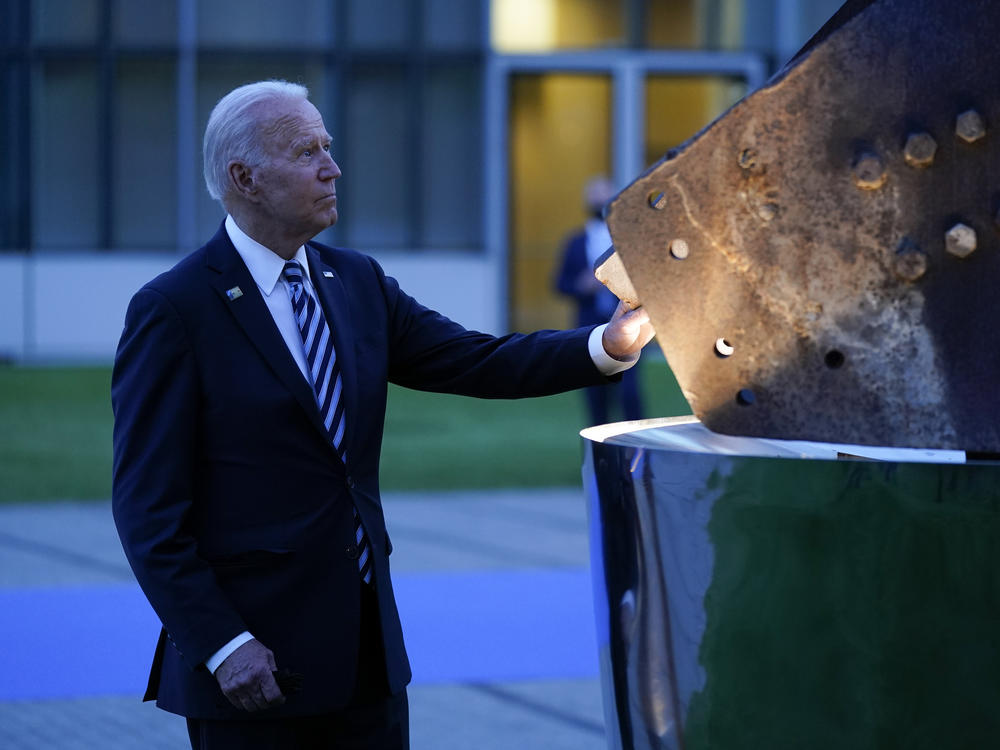Section Branding
Header Content
Biden Says Russia's Putin Is A 'Worthy Adversary' Whether Or Not He Trusts Him
Primary Content
President Biden said he's not focused on whether he can "trust" the Russian president ahead of their sit-down this week, but he's hoping he will be able to find some areas where he can work with Vladimir Putin — while laying out "red lines" for other areas.
Biden spoke with reporters after a day of meetings with NATO allies in Brussels. He said that he discussed the upcoming U.S.-Russia summit with alliance members and that leaders were supportive of his outreach to Putin.
Biden has repeatedly said he wants a stable and predictable relationship with Russia. On Monday, he called Putin "tough" and "bright" and said he's a "worthy adversary."
"It's not about trusting, it's about agreeing," Biden said. "When you write treaties with adversaries, you don't say: 'I trust you.' You say: 'This is what I expect.' "
Biden said he hopes that Putin is interested in "changing the perception the world has of him" and that he would engage in "appropriate behavior for a head of state."
Biden said he will stand up for Ukraine at the meeting but also said that Ukraine has not yet met the criteria to join NATO, saying the country still needs to clean up corruption issues.
The NATO summit is Biden's latest stop on his multiday tour through Europe. On his first trip abroad as president, Biden has sought to reassure allies that the U.S. is committed to taking the lead in international institutions, in contrast with the last administration's "America First" agenda.
Biden met Turkish President Recep Tayyip Erdogan on the sidelines of the summit for nearly two hours. Afterward, both Erdogan and Biden said it was a productive session. Relations have been strained over Turkey's purchase of a Russian missile defense system — and Biden's decision to use the word genocide to describe the mass slaughter of Armenians by Turks more than a century ago. The Turkish government has adamantly renounced Biden's statement.
Biden said he was "gratified" that NATO leaders agreed the alliance should adapt to address more modern threats such as climate change, cyberattacks and combating the growing influence of China — something for which he has been pushing.
The alliance agreed to back a new cyber defense policy aimed at deterring and defending against hacking threats.
On the China front, Biden scored a win during talks with the Group of Seven in Cornwall, England, over the weekend when the group agreed to help developing countries fund infrastructure projects to compete with China's Belt and Road initiative and to push back against some of Beijing's trade practices.
Biden has characterized the rise in power of autocracies such as China and Russia as a threat to the global order and the spread of democracy. He's urged allies to act as a "model" for the strength of democratic norms.
Biden plans to meet European Union leaders on Tuesday in Brussels, then will head to Geneva, where he will hold talks Wednesday with Putin. The two leaders will hold two bilateral sessions with aides and advisers. Biden will then have a solo press conference before heading back to the United States.
It will be a sharp contrast with former President Donald Trump's controversial joint press conference with Putin in Helsinki in 2018. Trump faced a firestorm of criticism after he backed Putin's denial of election interference in 2016, even though U.S. intelligence agencies had reached the opposite conclusion.
Ahead of his talks with Putin, Biden briefly met on the sidelines of the NATO summit with the presidents of Poland and Romania. He held a separate session with leaders from Estonia, Latvia and Lithuania – the members of the alliance geographically closest to Russia and most nervous about its incursions into Ukraine.
A White House official told reporters they discussed the recent move by Moscow-backed Belarus to ground a commercial flight heading for Lithuania so that a critic of Belarusian President Alexander Lukashenko could be arrested. The White House has said Biden intends to raise the issue with Putin on Wednesday.
NPR's Franco Ordoñez contributed to this report.
Copyright 2021 NPR. To see more, visit https://www.npr.org.

